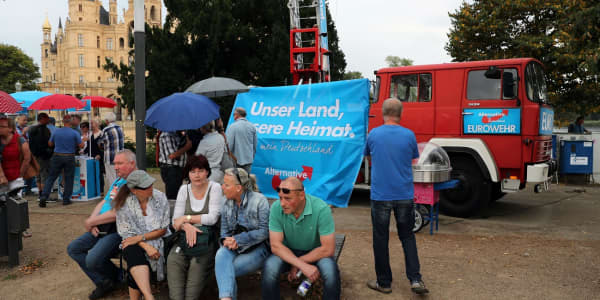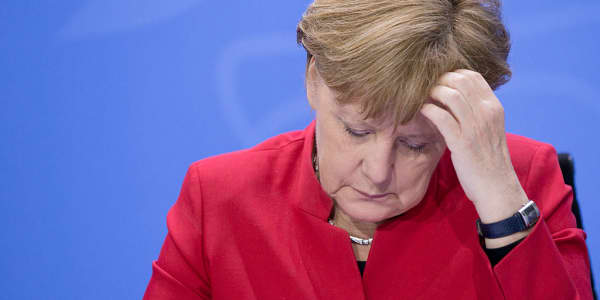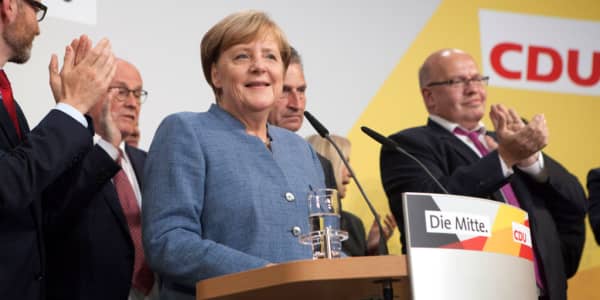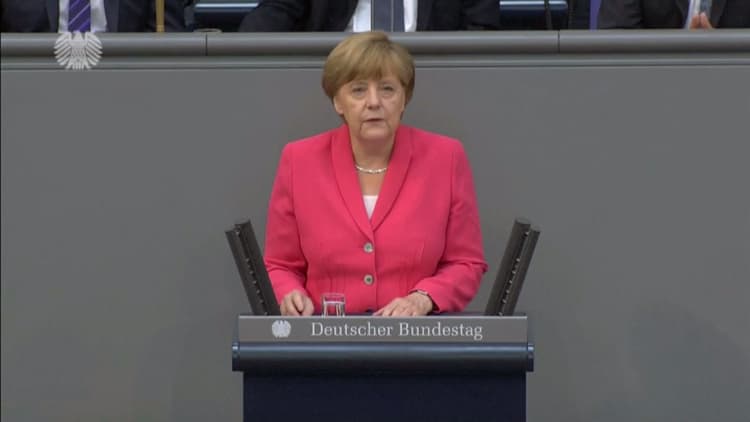
Germans are heading to the polls on Sunday September 24 for a federal election which will ultimately decide whether the incumbent chancellor, Angela Merkel, has another four years in power.
Polling stations open on Sunday morning and close at 6:00 p.m. local time (12:00 noon ET) and soon after, public broadcasters Das Erste and ZDF will present their exit polls. Although the first projections of the election outcome will come on Sunday evening, a definitive final election result could take until Tuesday.
Here's CNBC's guide on what to expect.
What is likely to happen?
Voter opinion polls have consistently pointed to Angela Merkel's center-right Christian Democratic Union (CDU) and its Bavarian sister-party the Christian Social Union (CSU) gaining around 36 percent of the vote, hence making it very likely that Merkel will return to power.
Polls have shown that the parties' closest rival, the center-left Social Democratic Party (SPD), has failed to gain momentum and it is currently in second place with around 22 percent of the vote.
The anti-immigration, anti-euro Alternative for Germany (AfD) party could come in third place with around 11 percent of the vote — gaining more than the 5 percent threshold of votes needed to enter parliament for the first time — as could the pro-business Free Democrats party (FDP), seen gaining around 10 percent of the vote.
Meanwhile, The Left (Die Linke) party is also seen gaining around 10 percent of the vote while the Greens are seen with 8 percent of the vote.
What do the main parties stand for?
The CDU-CSU: These sister parties tend to have very similar political stances — hence their long-standing union. Both parties lean towards the center-right and their policies are socially conservative, both were also founded on a Christian ethos. The CDU states that it "stands for a free and constitutional democracy, a social and ecological market economy, Germany's inclusion in the Western values and defense community, and the unification of the nation, as well as a unified Europe."
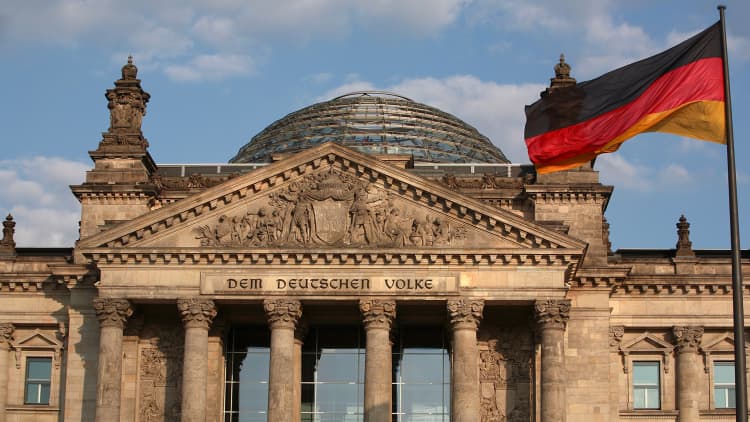
The SPD: The main center-left party in Germany is headed by Martin Schulz, former head of the European Parliament. Founded on socialist principles in 1869, it still claims to represent the interests of the working class – and hence its policies tend to promise social reform and more social equality and justice. It tends to have a bigger following in the country's industrial regions but has lost ground to parties on both its left and right, such as Die Linke and the AfD.
The AfD: The anti-immigration, anti-euro party is relatively new, having formed in 2013. Although it sprung up alongside other populist anti-establishment parties on the continent, the party has gained some traction in Germany, particularly with right-leaning voters. The party is critical of Merkel's migrant policy – which saw over a million refugees enter Germany in 2015 – and advocates immigration limits and leaving the euro.
The FDP: The FDP is seen as a liberal, pro-business party and have been a traditional ally of Merkel's CDU/CSU. The party is generally considered center-right and has pushed for economic liberalism, promoting privatization and free markets.
Other parties including Die Linke (The Left party) - a democratic socialist party founded in 2007 in Germany, and Alliance 90/The Greens which promote policies that have limited environmental impacts and focus on ecological, economic, and social sustainability.
Could there be a shock result?
It's very unlikely that Merkel will not be re-elected as chancellor, with her party expected to gain the most votes. Merkel will not officially be elected Sunday as chancellor and this is done further down the road by the new parliament in a secret ballot.
Carsten Nickel, deputy director of research at Teneo Intelligence, summed the expected result up in a note on Wednesday when he said: "Is there any realistic chance that Merkel will fail to win a fourth term in office? No."
But what is more uncertain is what parties will come together to form a coalition. Either the CDU-CSU could repeat the same tried and tested "grand coalition" with the SPD or it could form a new alliance with the smaller pro-business FDP party and Greens in a so-called "Jamaica coalition," so named due to the colors of the political parties involved. This is seen as the most likely scenario.
Another possible upset could come from the AfD, Teneo Intelligence's Nickel noted: "The AfD's result should be monitored closely, given the combination of high politicization and weak polarization, and considering the risk of response bias in the polls. Any better-than-expected performance would increase the pressure on the political center."
The next coalition?
Germany's complex electoral system means that coalition governments tend to be the norm in the country, and this election is no exception with three possible coalitions that could be formed after the election. The Bundestag must convene within 30 days of the vote but government formation could take up to 100 days, some analysts have said. These are the next three possible coalitions and their probability, according to Teneo Intelligence's Carsten Nickel.
Grand coalition (CDU/CSU-SPD) – 40% probability (down from 50%)
A "grand coalition" between the main parties would be a continuation of the status quo, but it would only be possible if Schulz's SPD does not get less than 23 percent of the vote (its result in 2009), Nickel said in his note. Polls currently point to the SPD getting around 22 percent, making the party the possible opposition of the future and calling into question Schulz's future. Nevertheless, another CDU-CSU-SPD coalition "would be positive for pragmatic euro zone reform" given Merkel and Schulz's pro-EU agenda.
'Jamaica' coalition (CDU/CSU-FDP-Greens) – 40% probability (up from 20%)
This coalition is currently the most likely, yet talks to finalize an alliance could take time, Nickel warned. "Talks could be prolonged and governance noisy given the two small parties' competition for the same constituency and the conflicts between CSU and the Greens on issues such as migration. Yet, an SPD result below 23 percent might make it clear already on Sunday night that all four have little choice but to meet at Merkel's home turf, the political center."
Christian-Liberal (CDU/CSU-FDP) – 20% probability (down from 30%)
As polls stand, it would be "numerically impossible," Nickel stated, for Merkel's conservative union to form a center-right coalition with just the FDP. However, "if the numbers were to add up on Sunday, the chancellor would have to opt for it." Although he believed this government would form quickly and might engage in some targeted tax cuts for the rich, it could experience some conflict over further European economic integration which the FDP is skeptical about.
How does Germany's political system work?
The elections for the German parliament, the Bundestag or lower house (the legislative branch of government), take place every four years and combine a mixture of "first past the post" and proportional representation voting systems.
Germany's electoral system is notoriously idiosyncratic but, put simply, voters are asked to cast two votes – one for a candidate in their regional constituency and one for a political party – that will fill the Bundestag's 598 seats.
This means that voters can split their votes between parties when voting for the constituency candidate they want to see in parliament, and the party they support.
Voters do not directly elect the next chancellor. The chancellor must be elected with an absolute majority of the Bundestag's members. The candidate for chancellor is from the party that wins the most votes, raising Merkel's chances of re-election, given the voter polls.



